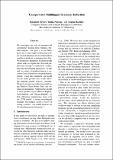Unsupervised multilingual grammar induction
Author(s)
Snyder, Benjamin; Naseem, Tahira; Barzilay, Regina
DownloadBarzilay_Unsupervised multilingual.pdf (266.0Kb)
OPEN_ACCESS_POLICY
Open Access Policy
Creative Commons Attribution-Noncommercial-Share Alike
Terms of use
Metadata
Show full item recordAbstract
We investigate the task of unsupervised constituency parsing from bilingual parallel corpora. Our goal is to use bilingual cues to learn improved parsing models for each language and to evaluate these models on held-out monolingual test data. We formulate a generative Bayesian model which seeks to explain the observed parallel data through a combination of bilingual and monolingual parameters. To this end, we adapt a formalism known as unordered tree alignment to our probabilistic setting. Using this formalism, our model loosely binds parallel trees while allowing language-specific syntactic structure. We perform inference under this model using Markov Chain Monte Carlo and dynamic programming. Applying this model to three parallel corpora (Korean-English, Urdu-English, and Chinese-English) we find substantial performance gains over the CCM model, a strong monolingual baseline. On average, across a variety of testing scenarios, our model achieves an 8.8 absolute gain in F-measure.
Date issued
2009-08Department
Massachusetts Institute of Technology. Computer Science and Artificial Intelligence Laboratory; Massachusetts Institute of Technology. Department of Electrical Engineering and Computer ScienceJournal
Proceedings of the Joint Conference of the 47th Annual Meeting of the ACL and the 4th International Joint Conference on Natural Language Processing of the AFNLP
Publisher
Association for Computational Linguistics
Citation
Snyder, Benjamin, Tahira Naseem, and Regina Barzilay (2009). "Unsupervised multilingual grammar induction." Proceedings of the Joint Conference of the 47th Annual Meeting of the ACL and the 4th International Joint Conference on Natural Language Processing of the AFNLP (Morristown, N.J.: Association for Computational Linguistics): 73-81. © 2009 Association for Computing Machinery.
Version: Author's final manuscript
ISBN
978-1-932432-45-9
Keywords
algorithms, design, experimentation, languages, measurement, performance